Do you remember the saying “always a bridesmaid but never a bride?” It first appeared in the US in 1925, thanks to the Listerine mouthwash commercial (implying that women who used it had better chances of getting married).
It is widely used these days to speak of a person who has potential that’s not been fulfilled.
How about “always getting ready to teach online, but never starting?” OK, I agree – it’s not most elegantly put, but you get the idea. The “getting ready” folks never seem to actually get ready.
Most of the time they’re “not ready yet.” I’m sure many of us have said it once or twice – nothing wrong with that.
I do understand that in some situations we indeed may not be ready, which is why I’ve included applications on the page where I list my programs and services. I want to be able to tell people whether or not they are ready and what would work best for them.
This post however is for people who are cautious about making steps towards their dream, and most of the time the cautiousness is framed by a single phrase, “I’m not ready yet.”
If you’re currently teaching in a traditional classroom, and the thoughts of a flexible schedule, freedom of learning design, traveling while working, being your own boss, are tempting you to “opt out” of the traditional classroom, you’re probably thinking that one day you could give it a try.
But not now.
Now you’re not ready.
So what does it mean to get ready and when is the good time to start? Why do we love the thought of getting ready to start more than actually starting? How can you change that?
Getting ready: what does it mean?
The most generic definition is “prepared mentally or physically for some experience or action.”
When you’re thinking of starting an online teaching business, and not just teaching a couple of students on skype here and there, the thought might be terrifying. You put it off for some time, and then it becomes a dream in the far away future that never arrives.
Getting ready (just like “trying”) is a deceitful expression that… allows us to continue doing nothing.
Getting ready (just like “trying”) is a deceitful expression that… allows us to continue doing nothing.Click To Tweet
On the contrary, getting ready has to mean preparing. Like putting certain things/systems in place before the event.
Think of having people over for dinner for instance. You have to get ready, and you break the process into steps:
- Schedule the time and date.
- Decide on the menu.
- Go grocery shopping.
- Take the time to prepare the food.
- Have dinner with friends.
So if you’re teaching in a traditional classroom, but are hoping to teach online some day, here’re 10 things you need to be doing right now to get prepared. This is, if online teaching is something you actually want to do.
This guide will help you get some things in place instead of dreaming of that one day and keep coming up with excuses why you shouldn’t be doing this or that, claiming you’re not ready yet.
10 Things to Check Off your List as You’re Getting Ready to Teach Online.
#1. Get to know yourself.
The better you know yourself, the more meaningful your business (and life!) is going to be. You won’t resort to gimmicks or sleazy tactics to get people to buy from you. They will buy from you because they will know you. They will know you when you know yourself.
How do you do that? Begin spending time crafting the vision you have for your business. Tara Gentile expressed it this way “You can’t create what you can’t see.” Cathy Presland has some fantastic reflection questions/exercises in her course* Start a Business you Love. Idea to Income in 30 Days.
#2. Get to know your ideal client.
It’s simple. The day you decide to say “no” to people who make you miserable, you will open up doors to work with those who make you happy (aka, your “ideal client“). Happy clients will bring you more business. They charge you with energy and creativity.
Waiting until you get clients and then figuring out whether or not they’re ideal isn’t a good strategy. Think of it now. Who do you enjoy working with the most?
#3. Craft the core message for your ideal client.
In her recent post, Veronika Palovska quoted Jeff Goins’s definition of core message:
Every [BLANK] can/should [BLANK].
When I started out this blog for online teachers my core message was (and still remains),
Every (online) teacher can earn what they are worth.
I even had a picture taken with this message written on my arms. (Picture credits: Dear World).
I may have narrowed my niche down from basic advice on how to teach online to how to run a smart online teaching business, but my core message hasn’t changed.
<<I still believe that every teacher can and should know how to make what they’re worth.
<< This makes me wake up every morning. This drives everything I do.
#4. Re-frame your thinking.
Completing every task successfully involves 2 components: a) you believe you can do it (and visualize yourself doing it) and b) you actually do it.
As an online teacher I used to overdo the “doing part” (no pun intended), without visualizing where my online business should be. I’ve since learned that re-framing your mindset and uprooting negativity is a great way forward.
Any books by Brene Brown are highly recommended to begin thinking of yourself differently, more powerfully, so you can live a more fulfilled life.
#5. Spend time learning and strategizing (by that, I don’t mean collecting information, but translating information into action).
What does a typical online course look like? Lots of videos/tutorials on how-to, but less practical stuff. There are exceptions, of course, but an online course is compelling to you (and me) as long as it has lots of videos.
That’s why I’ve refrained from creating courses only, without an option of coaching, group feedback or other interaction. If you want to get ready, don’t just buy courses in hopes of learning something some day. Learn 1 thing, implement, see how it works, ask for feedback.
In his post on How to Learn in two days what normally takes six months, Benjamin Hardy writes,
“True learning involves a permanent change in how you see and act in the world. The accumulation of information isn’t learning.
If you want to learn something quickly, you need to immerse yourself in that thing and immediately implement what you’re learning.“
#6. Spend time writing/creating focused content and engaging with your audience.
You can’t teach online without students. But getting people to sign a contract with you is a long process. On average, it takes 8-12 months for an engaged consumer of my content to become my client.
That differs if you’ve been endorsed by someone or have collaborated with someone who’s trusted, but still client making takes time.
If you plan to start teaching online in 2 years, now is a good time to begin creating content. If you plan to blog to connect, I highly recommend my friend Veronika Palovska’s Write with Clarity and Confidence coaching program.
Nothing will prepare you to write web copy that connects and sells better than her program (and she’s an online teacher, too, so she knows what your business is about).
#7. Invite your audience to continue their conversations with you via email.
No, email isn’t dead. In fact, 95% of my sales comes through my email list. But it doesn’t happen the way many think:
a person signs up >> I send a sales email >> they buy.
Sales are a by-product. Remember that.
Next time you start stressing over the money, re-frame your thinking and begin focusing on meaning. Ask yourself whether you are sincerely engaging with your future clients, and if your email communication through email is consistent. This will prepare you to start taking in clients when the time comes.
#Teacherpreneurs: 10 things to do before you start #teaching #online. Click To Tweet
#8. Gain more visibility by collaborations (plan guest posts, interviews, etc.).
Visibility is tough for beginners, and the fact that you don’t have that many views can seem pretty depressing.
Let’s re-frame our thinking though, shall we? You don’t need a lot of visibility. You need consistent exposure to different audiences.
Instead of looking at insanely hype blogs like New York Times and getting frustrated with their 12-month wait time, look for smaller blogs and contact its author. (By the way, I’m not against New York Times: go for it! Just think of other options, too).
Don’t get to fascinated by the numbers of followers or page views attached to the “influencer.”
In his book The Art of Social Media, Guy Kawasaki wrote,
Remember that nobodies are the new somebodies.
Even small exposure to a new audience on a consistent basis is better than once-a-year post in a big magazine. And you have plenty of time doing that before launching your own website.
#9. Package your expertise into a free product.
If you’re teaching in a traditional classroom, chances are you have a steady income. It may not be stellar, but it’s steady.
This means that you aren’t in a rush to start making money from your online business. But that doesn’t mean that you can’t launch anything.
In fact, it’s a wonderful opportunity for you to test the waters and release something into the world. It will give you experience, exposure and enough feedback for the launch of your product.
#10. (when you’re about to launch): create a landing page.
Note that I’m not starting with a website. Creating a website while you’re preparing for online teaching, brainstorming your niche, your product ideas, your focus, your life goals, vision for your business, is a waste of time and money.
I’ve paid money for a website that doesn’t exist anymore and I spent countless hours on another website that wasn’t well-niched or targeted (and as a result I couldn’t monetize it).
What you see today is a fruit of several years of prep-work (6 to be precise, so you don’t have an overnight success impression).
The downside is, I had to do the prep-work while also making money teaching on skype. That’s because I didn’t opt out on my own (i.e. I didn’t have time to get ready), I was opted out = laid off (more on that in the book).
You can do things differently. You can be smarter than me.
What now?
If you’re a classroom teacher who thinks, “One day when I stop teaching online I’ll be ready to figure this out,” I encourage you to challenge that thought pattern. Now is a good time.
Not only is the “not-ready-yet” unrealistic (I mean, can anyone ever be ready?), it’s an unhealthy mindset to have, both for work and personal life.
It rings close to “When I have X I will be happy,” and is one of the patterns of a perfectionist, according to Elizabeth Lombardo’s Better than Perfect: 7 Strategies to Crush Your Inner Critic and Create a Life You Love.
So here’s what you can do now:
- Join my Smart Teacher’s Library and begin learning and growing as a teacher and an online business owner in a community of like-minded souls. You get access to a growing number of resources, challenges and live trainings. Also, you an ask me or Veronika Palovska (my co-librarian and web designer) any questions pertaining to your business.
- Read the book I wrote with Veronika Palovska, Opted Out of the *Real Job* e-book to cut through the noise and focus on what matters.
Once you go through that, you will be ready. But don’t take any of these courses lightly. You must do the unpleasantly hard work of thinking about your business. Complete the assignments. Sweat if you like.
The process is hard and messy because as teachers we would rather create 15 meaningless posts and pay somebody to put together a nice website. We would much rather create a course that doesn’t represent us and ruins our brand. So this thinking process is worth it.
It helped me create something unique.
It will help you stand out in the noise of websites that look and speak exactly alike.

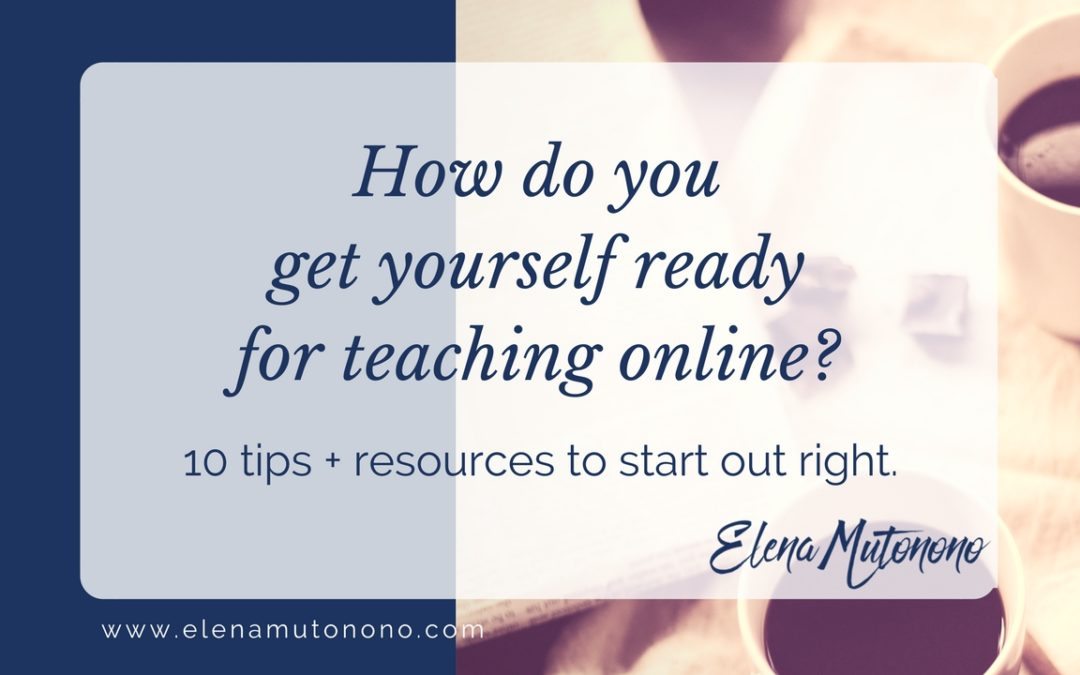

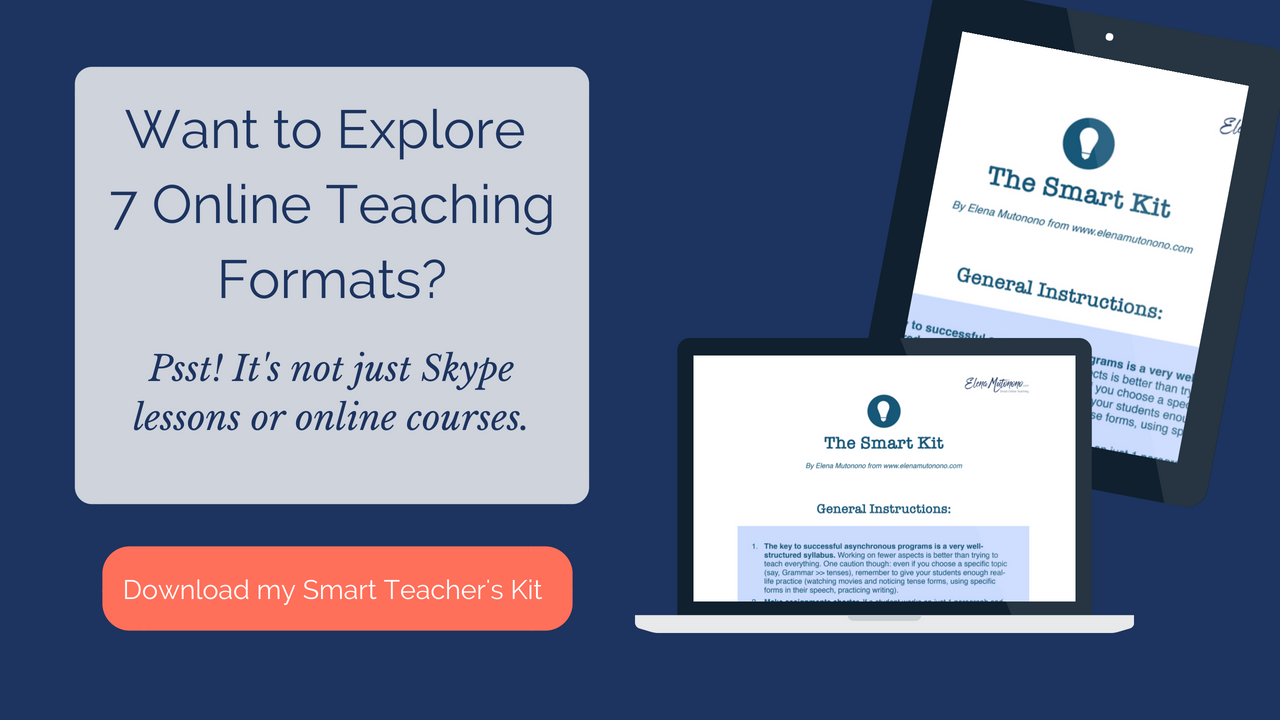
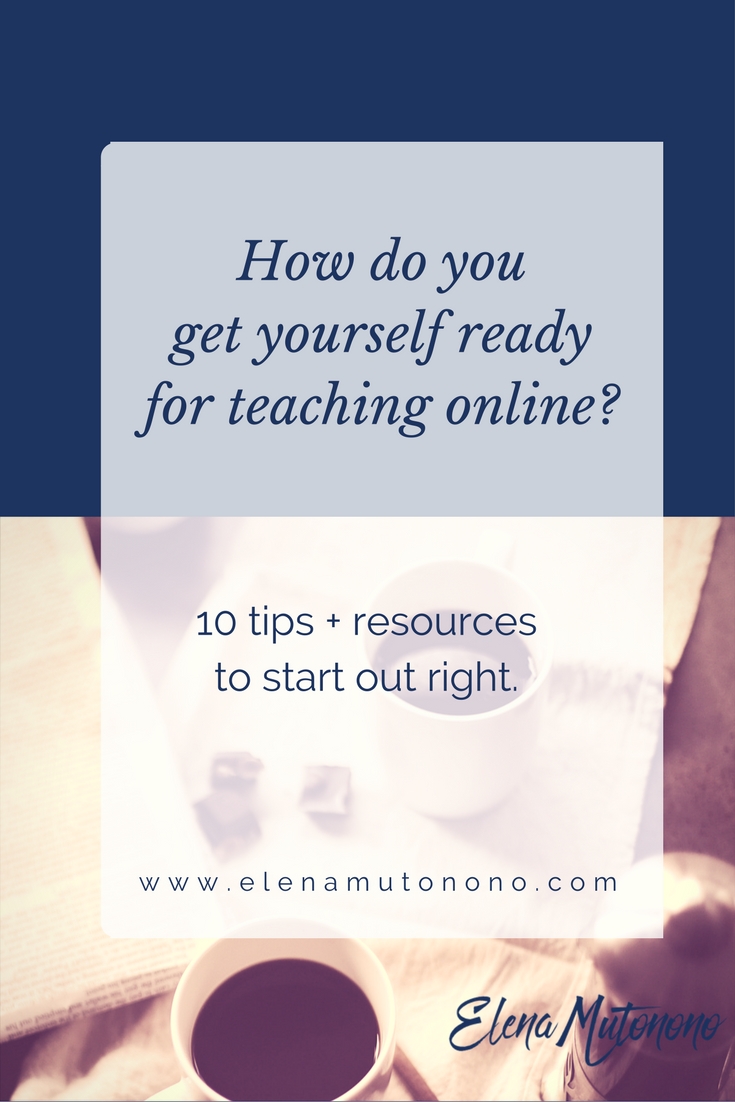
 Welcome to my nook where *Big Magic* happens. My name is Elena Mutonono, I help small business owners package their services as digital products and sell them online. I want you to work smarter, not harder. Increase your impact beyond your current face-to-face clients. Grow your business as you reach more people all over the world.
Welcome to my nook where *Big Magic* happens. My name is Elena Mutonono, I help small business owners package their services as digital products and sell them online. I want you to work smarter, not harder. Increase your impact beyond your current face-to-face clients. Grow your business as you reach more people all over the world.
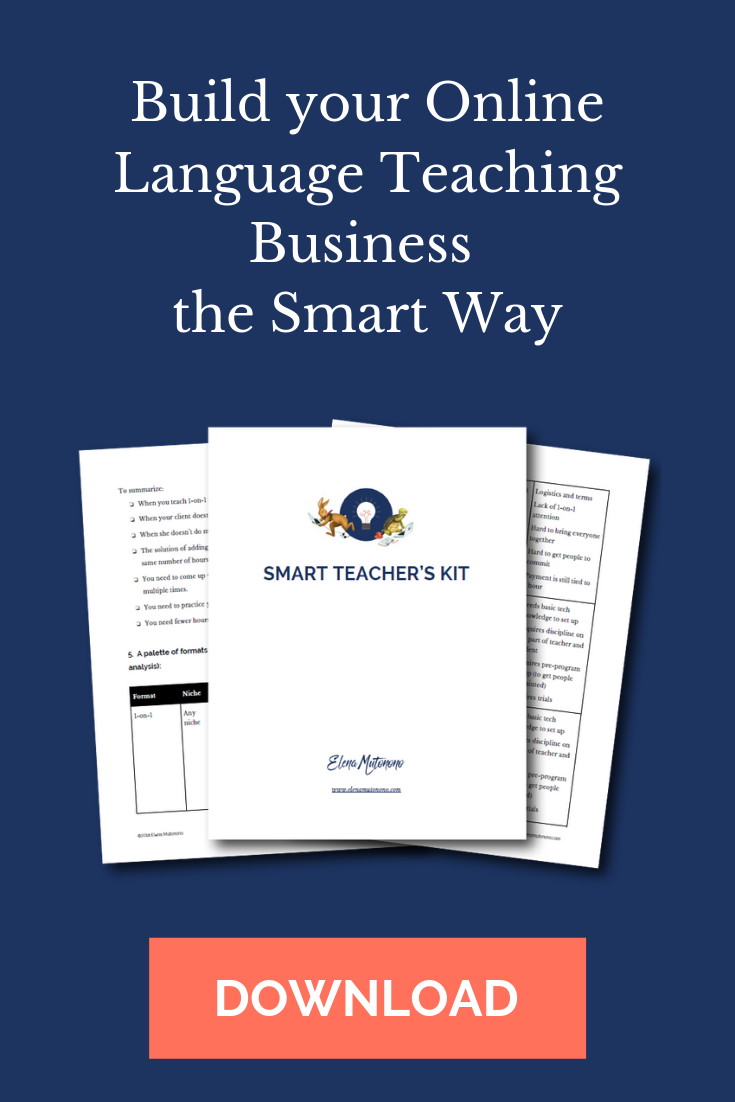


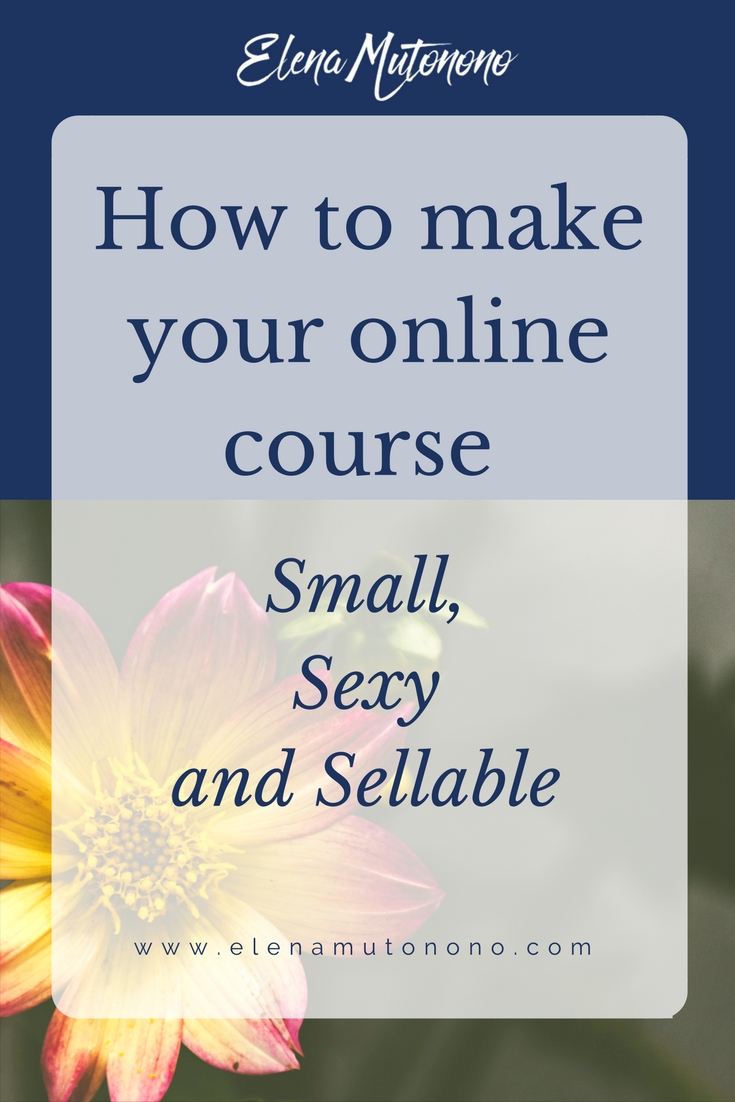


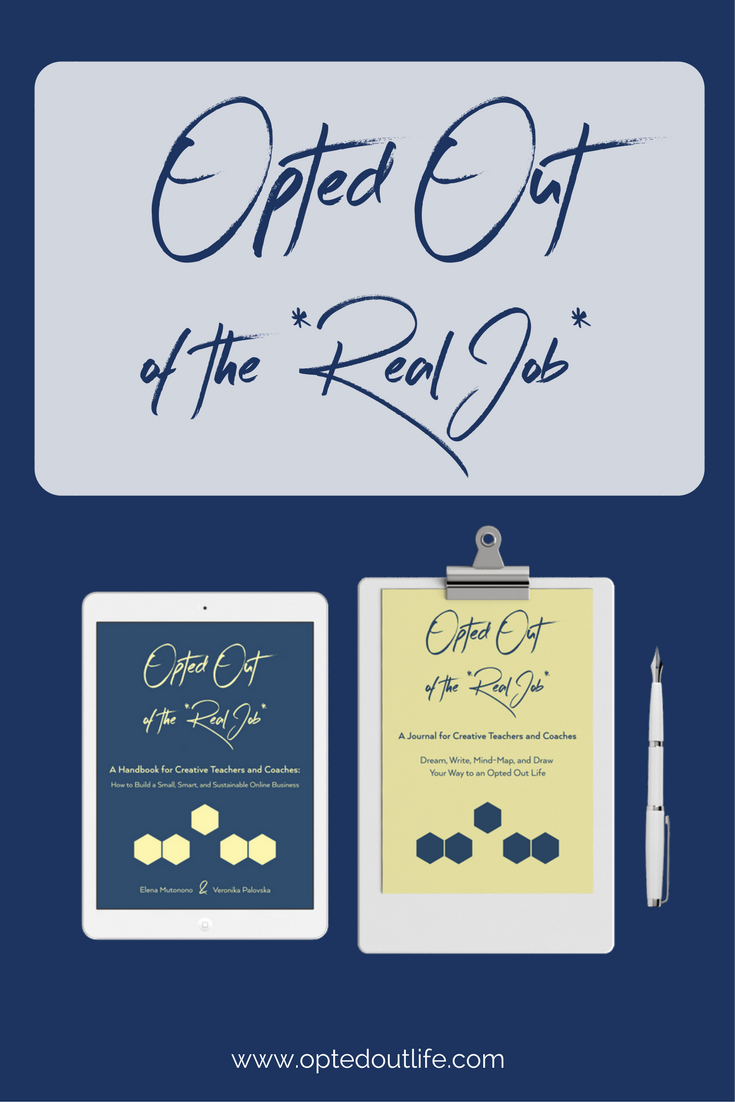

Thank you, Kerstin! I appreciate your input.
Glad this was helpful! Come back for more goodies 🙂
Lena,
Thank you for this post. I bookmarked it and read it multiple times, there’s so much value in it.
I love this roadmap. I still don’t feel “ready” in many possible ways, but you always help me get unstuck and take action. And that’s the only thing that really matters – taking action, one step at a time, day after day.
Thank you. Also, thank you for linking to my resources <3
Thank you for sharing your wisdom and expertise with me and my tribe. They’re richer and much more prepared to stand out thanks to your message that you share so boldly!
Hi Elena
Thanks for this wonderfully mind-blowing and eye-opening post!
You said it all… it’s so easy to mistake preparation for procrastination and without a leap of faith nothing will ever come out of our dreams, and we may end up never opting-out of the traditional classroom, which is probably the worst that could happen to all of us who believe that teacher preneurship is the way to go. Thanks again and do keep inspiring us 🙂
“Mistaking preparation for procrastination.” Well said. I know you’ve started making bold steps towards your dream, so yes, keep moving forward!
Thank you, Elena. I just re-read this post again and can now say that what you say is absolutely true to my experience. I’ve taken your free course, read Opted-Out, and step-by-step began my online business. After 4 months, I was ready to take your Express Email List Builder course and am now very nearly ready to launch my first free eGuide and build my list. I met my goal of attracting 6 nearly “ideal” clients and have a website, blog content and more product ideas in the works. I continue to cycle through each of these tips and find focus and inspiration. Thank you so much for sharing your wisdom and experience!
Kate, it’s amazing how much we can do when we just keep walking, doing one small thing after another. The hardest part is to get started and then keep going! I’m so happy to see you building your business!
Thanks for these great ideas of how to get started.
I’m guilty of this procrastination. I got to change my mindset
for immediate commencement of” opted out”I’m greatly
inspired by this write-up.
Thanks for sharing your wealth of experience.